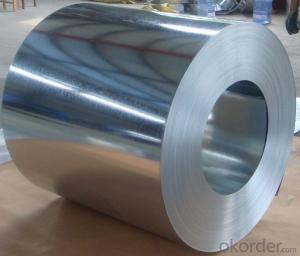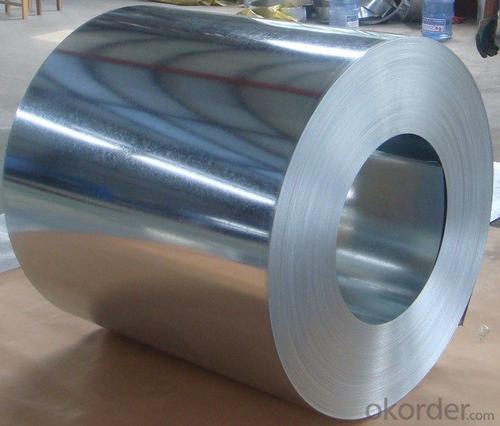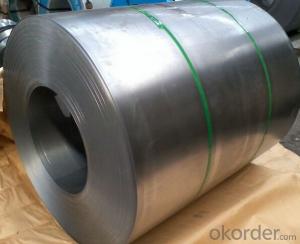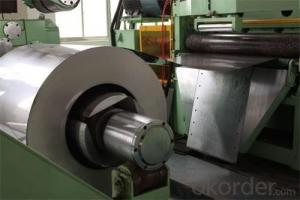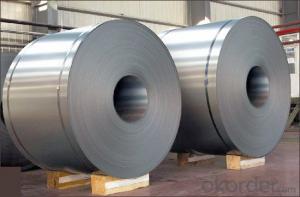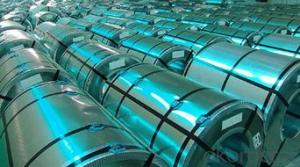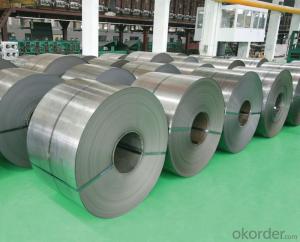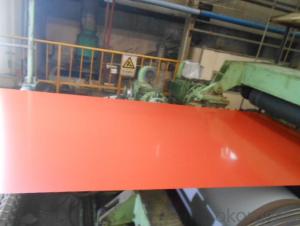Cold Rolled Steel Coil EN10142 -Chinese Best Quality
- Loading Port:
- China main port
- Payment Terms:
- TT OR LC
- Min Order Qty:
- 50 m.t.
- Supply Capability:
- 10000 m.t./month
OKorder Service Pledge
OKorder Financial Service
You Might Also Like
Specification
Cold Rolled Steel Coil EN10142 -Chinese Best Quality
1.Structure of Cold Rolled Steel Description:
The raw material of cold rolled steel coil/sheet is high quality hot rolled product, and after pickling continuous rolling, degreasing, annealing,skin pass,slitting and cut to length line etc. Along with it many kinds of new technology and new process of global cold rolling production have been applied.
2.Main Features of the Cold Rolled Steel:
• Excellent process capability
• Smooth and flat surface
• Workability, durability
• Excellent heat resistance performance
3. Cold Rolled Steel Images
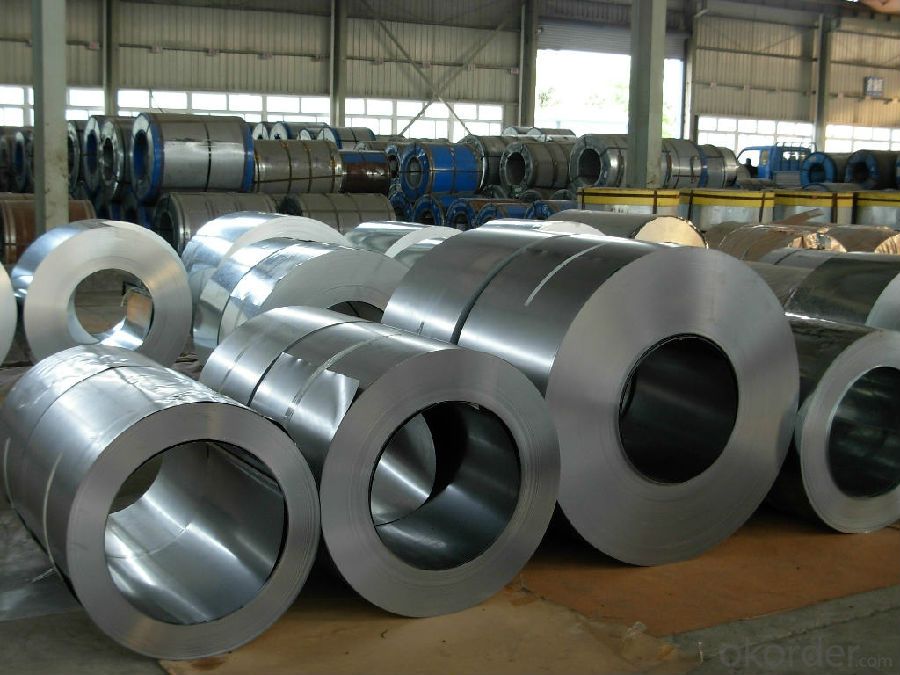
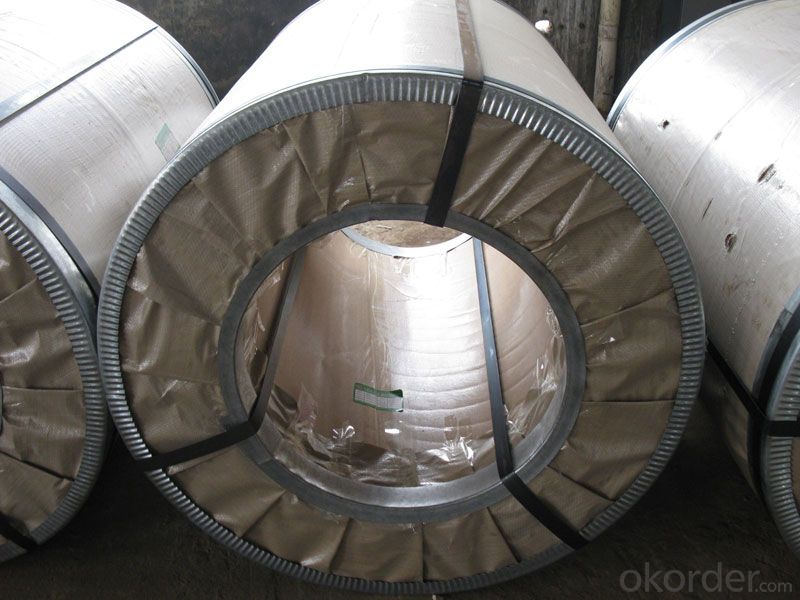
4.Cold Rolled Steel Specification
Standard: JIS G3302 ASTM 653M EN10142
Grade: Q195~Q345
Thickness: 0.16mm~2.0mm
Width: 1250mm MAX
Coil weight:3-12 MT
Coil ID:508/610mm
FAQ
1.How to guarantee the quality of the products?
We have established the international advanced quality management system,every link from raw material to final product we have strict quality test;We resolutely put an end to unqualified products flowing into the market. At the same time, we will provide necessary follow-up service assurance.
2. How long can we receive the product after purchase?
Usually within thirty working days after receiving buyer’s advance payment or LC. We will arrange the factory manufacturing as soon as possible. The cargo readiness usually takes 15-25 days, but the shipment will depend on the vessel situation.
- Q: How are steel coils secured during transportation?
- Steel coils are typically secured during transportation using metal bands or straps, which are tightly fastened around the coils to prevent them from shifting or falling off. Additionally, wooden blocks or dunnage may be used to provide stability and prevent movement within the transportation container.
- Q: How are steel coils used in the production of steel nails?
- Steel coils are used in the production of steel nails as they serve as the primary raw material. These coils are unwound and fed into a nail-making machine, where they are cut into the desired length and shaped into nails.
- Q: Can steel coils be coated with luminescent materials?
- Yes, steel coils can be coated with luminescent materials.
- Q: i was thinking like getting a a steel building for 2 or 3 stall does anyone know how much that would cost? Have anyone used steel building how do you like them etc
- a great style of human beings are putting up those steel homes made by making use of agencies like Cleary or Morton because of the fact they are greater fee effective. yet in my opinion, i don't think of they greater wholesome horses all right. They dent very relatively, all the horse has to do is lean against it somewhat. additionally they provide no insulation so as that they are like little ovens interior the summertime and are fairly chilly interior the wintry climate. in case you're able to have adequate money it, i might flow with a competent previous formed timber barn.
- Q: What are the challenges faced in the recycling of steel coils?
- The recycling of steel coils presents several challenges that must be overcome. To start, the collection and sorting process poses a significant hurdle. Steel coils are often utilized in large-scale industries and construction projects, making it challenging to gather and transport them for recycling purposes. Moreover, steel coils can become mixed with other materials, such as plastic or wood, further complicating the sorting process. Another obstacle is the size and weight of steel coils. Given that steel is a heavy material, handling and processing large coils can be quite difficult. Specialized equipment and machinery may be necessary to efficiently move and separate the coils, thereby increasing the cost and complexity of the recycling process. Additionally, the recyclability of steel coils can be impacted by varying quality. These coils may contain impurities or contaminants, such as oil or paint, that must be eliminated before recycling. Such impurities can compromise the integrity and quality of the recycled steel, making it less desirable for certain applications. Moreover, the recycling of steel coils demands substantial energy and resources. Melting down the steel requires a significant amount of energy, while the transportation and processing of the coils also consume resources and contribute to carbon emissions. Consequently, the environmental friendliness of the recycling process can be diminished. Lastly, the viability of the recycling industry can be influenced by fluctuating market demand for recycled steel coils. The demand for steel products can vary depending on economic conditions and industry trends, making it challenging for recyclers to find buyers for their recycled coils. This can potentially result in stockpiling or disposal difficulties. In conclusion, while recycling steel coils offers environmental benefits and resource conservation, several challenges must be addressed for its successful implementation. These challenges encompass collection and sorting, handling and processing, quality control, energy and resource consumption, as well as market demand.
- Q: What are the different grades of steel used in manufacturing steel coils?
- There are several different grades of steel that are commonly used in manufacturing steel coils. These grades include carbon steel, stainless steel, and high-strength low-alloy steel (HSLA). Each grade has its own unique properties and characteristics, which make them suitable for specific applications in various industries.
- Q: At what temperature does steel start to warp or soften.
- It depends upon the composition of steel. Carbon steel, which does not have many alloying elements, softens around 1200C while with alloying elements, this transition temperature either drops or raises depending upon what is added. Higher carbon makes this temperature drop. This is a very important question for forging since if a lower temperature is used, forging won't be easy and at higher than softening temperature, it is not easy to handle. The temperature at which steel begins to soften is, in general, much above what the metallurgists call AC1 or AC3 temperature.
- Q: How do steel coils compare to aluminum coils?
- Steel coils and aluminum coils possess distinct characteristics that render them suitable for varying purposes. Firstly, steel coils are renowned for their robustness and durability. They can endure high temperatures and exhibit greater resistance to damage in comparison to aluminum coils. Consequently, steel coils are an ideal choice for heavy-duty industrial applications necessitating sturdy materials, such as construction, automotive manufacturing, and the oil and gas industries. Additionally, steel coils boast heightened corrosion resistance, enabling their usage in outdoor environments characterized by harsh conditions. On the contrary, aluminum coils are lighter in weight and possess a higher strength-to-weight ratio than steel coils. This renders them exceptionally well-suited for industries wherein weight serves as a critical factor, such as aerospace and transportation. Furthermore, the malleability of aluminum coils facilitates easier shaping and forming, thereby proving advantageous in industries like packaging and consumer electronics. Moreover, aluminum coils exhibit superior thermal conductivity when compared to steel coils, rendering them more efficient in heat transfer applications. This particular attribute proves beneficial in industries such as HVAC (heating, ventilation, and air conditioning) and refrigeration, where the achievement of efficient heat exchange is of utmost importance. Concerning cost, steel coils generally prove more affordable due to the lower cost of raw materials. However, aluminum coils can yield long-term cost savings as they require less maintenance and possess a longer lifespan owing to their resistance to corrosion. In conclusion, the selection between steel coils and aluminum coils hinges on the specific requirements of the application at hand. Steel coils are favored for their strength, durability, and corrosion resistance, while aluminum coils excel in lightweight applications, heat transfer, and malleability.
- Q: What are the advantages of using pre-painted steel coils?
- There are several advantages to using pre-painted steel coils. Firstly, pre-painted steel coils have a protective coating applied during the manufacturing process, which makes them resistant to corrosion and increases their lifespan. Additionally, the pre-painted coating provides a smooth and aesthetically appealing finish, eliminating the need for further painting or finishing. This saves time and money on additional coatings or treatments. Moreover, pre-painted steel coils are available in a wide range of colors and finishes, allowing for greater design flexibility and customization. Lastly, pre-painted steel coils are easy to install, lightweight, and have excellent durability, making them an ideal choice for various applications in construction, automotive, and other industries.
- Q: iam talking abt carbon steel of composition:-C=0.15wt% Mn=0.60wt% P=0.035wt% S=0.04wt% Cu=0.20 (min)wt%....
- The composition of the steel is almost tertiary to many other considerations, except that there are certain elements and percentages of elements which tend to affect the crystaline structure in the steel. The most basic question is whether the crystaline arrangement of atoms in the steel is martensitic or austenitic, and many factors influence that. In general, martensitic structure is magnetic and austenitic structure doesn't respond much to magnetic fields, but there are varying degrees of martensitic and austenitic -- there is never a pure state. Read the articles at bottom.
Send your message to us
Cold Rolled Steel Coil EN10142 -Chinese Best Quality
- Loading Port:
- China main port
- Payment Terms:
- TT OR LC
- Min Order Qty:
- 50 m.t.
- Supply Capability:
- 10000 m.t./month
OKorder Service Pledge
OKorder Financial Service
Similar products
Hot products
Hot Searches
Related keywords
